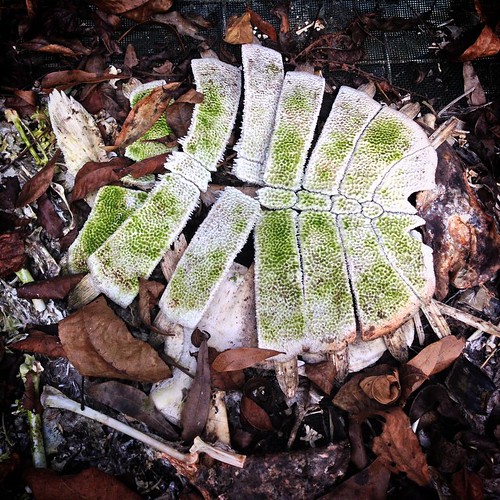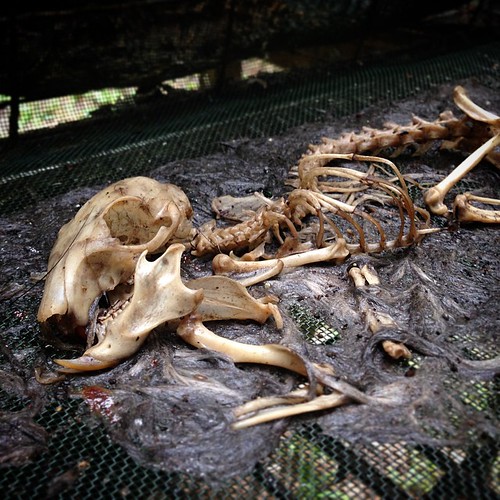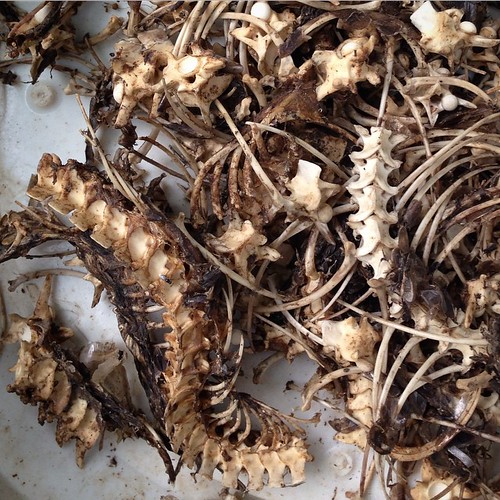I am frequently asked - "Can I just leave animals to decompose in a bone cage & do nothing else?"
No, it is only one of the first steps in my bone processing techniques. There have been some misconceptions about how bone cages are used in my processing. There are several reasons you don't want to just leave an animal carcass in a bone cage for the months or even years it could take for nature to clean it for you.
No, it is only one of the first steps in my bone processing techniques. There have been some misconceptions about how bone cages are used in my processing. There are several reasons you don't want to just leave an animal carcass in a bone cage for the months or even years it could take for nature to clean it for you.
Reasons Not to Leave Bones in a Bone Cage:
Lichen, moss, mold, algae etc can start to grow into the bones. Sometimes you can't get this plant life out of the bone. Or the green stain off.

Fallen leaves will eventually stain & decay the bones too. Also, you greatly chance getting rust on your bones which I've yet to find a fix for in over 30 years. So yes, rust stains are permanent in bone. Even though I put screen down over the metal wire cage it can still ruin the bone if left too long.

Note the screen under the squirrel to catch tiny teeth/bones and keep it from rusting.
Lichen, moss, mold, algae etc can start to grow into the bones. Sometimes you can't get this plant life out of the bone. Or the green stain off.

Fallen leaves will eventually stain & decay the bones too. Also, you greatly chance getting rust on your bones which I've yet to find a fix for in over 30 years. So yes, rust stains are permanent in bone. Even though I put screen down over the metal wire cage it can still ruin the bone if left too long.

Note the screen under the squirrel to catch tiny teeth/bones and keep it from rusting.
Pictured below are diamondback rattlesnake vertebrae & ribs I just removed from my bone cage today. I removed as much excess skin that remained then started them with the maceration process.


Normally my bone cages are used simply to let the wild carrion insects deflesh the animal remains for me. Then I move the bones onto the maceration step to further clean them of flesh, skin, ligaments, cartilage & such. Then degrease if needed and last step is the sanitizing & whitening hydrogen peroxide bath.
So in summary, if you left an animal carcass in a bone cage for the months or even years it could take for nature to fully clean it for you... you would likely end up with very weathered and flaky bone, with rusty undersides and plant growth.
So in summary, if you left an animal carcass in a bone cage for the months or even years it could take for nature to fully clean it for you... you would likely end up with very weathered and flaky bone, with rusty undersides and plant growth.



2 comments:
Hi there, Jana.
I'm a fan from South Africa and have periodically read through your blog out of curiosity and for advice.
I understand you get a lot of queries so I will try and keep this short, and hope that you do have some time, even for a short reply.
Despite my usual home, I currently find myself in your country for a while. While out and about last month I came across a dead opossum, and given my huge interest in processing bones, I scooped it and took it back home. Now, I am getting pretty used to processing things back in Africa, but I find everything is quite different here. I know you live in Florida and I know the climate where I live back home is pretty damn similar. I have found very deceased cats that have started decomposing almost immediately in that heat. Several days later and they are crawling with every bug imaginable and smelling dreadful. I take our constant warm weather for granted, though I use the controlled hot water maceration technique back home with great results.
My problem here in the states, PA to be more exact, is the cold! At first glance I took the opossum to perhaps be a day or two dead, but after a while I realised it had to have been there for longer. The cold was just refrigerating it and stopping it from decomposing. A problem I have never encountered. I made a little bone cage/container for it and took it out to the woods, in the hopes with the warm weather approaching it may just be in time to start decomposing. But my other thought was with this weather it would simply dry out and mummify before many insects could get at it. After looking at it today I feel that is exactly what is happening. So, any suggestions? Should I leave it out there and when it gets much warmer, and is constantly so, soak it in water for a bit and leave it out again, hopefully re-starting the decomposition/insect eating process. Or should I bring it back home and try to macerate it, even though there is probably far too much meat on it for maceration and were I to clean some off it would surely damage the skull.
I would just love to add a North American animal skull to my collection, if I can even get it back home. I am worried about customs back home and need to look into that. Or even such a thing leaving this country. I have seen many skulls on eBay that ship worldwide so I am hoping it is okay.
Sorry, this was longer than I had hoped but I thought I might try my luck and ask for some advice, something I seldom do.
Kind regards,
Decland
(p.s, could not work out where best to send this to you, sorry if this is an inappropriate place!)
Hi Decland... Pretty sure I already replied to you a while ago about this at my FB page?
Post a Comment